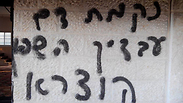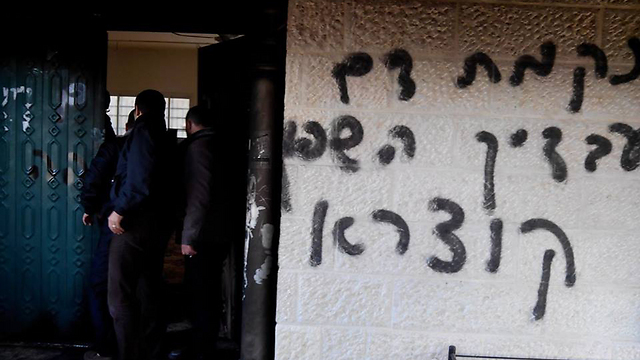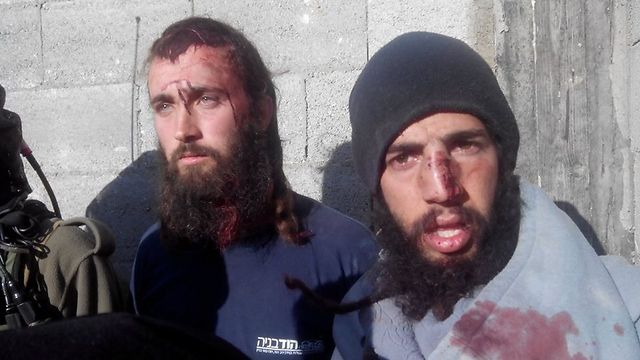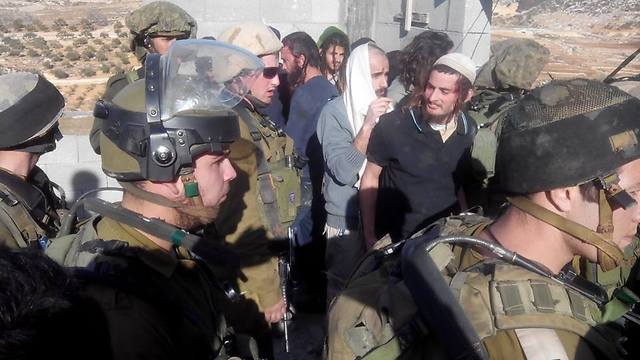
'Price Tag'
צילום: רבנים למען זכויות אדם
UN says pace of Israeli settler attacks up 4-fold
Tensions in West Bank between settlers and Palestinians reach new highs. 'Price tag' attacks and Palestinan security incidents continue to plague IDF
Just as news broke of an additional 'price tag' attack on a West Bank mosque, UN figures claimed that the annual rate of settler attacks has almost quadrupled in eight years.
According to the UN, Israeli security forces have largely failed to stem the attacks in which assailants cut down trees, deface mosques and beat Palestinian farmers.
Israeli leaders have repeatedly denounced such attacks – Defense Minister Moshe Ya'alon branded them "outright terrorism" just last week – and the military says soldiers are under strict orders to stop them.

Alleged 'price tag' attack in wake of Qusra incident (Photo: Rabbis for Human Rights) (צילום: רבנים למען זכויות אדם)
Still, critics say the Israeli governments have often been reluctant to confront settlers, even those seen as a hard-line fringe.
Related stories:
- 'Arabs out' sprayed on West Bank mosque
- Palestinians say protected settlers from locals' revenge
- Price tag in Kfar Qassem, foiled plot against demolisher
"There is not enough pressure from the prime minister, the defense minister, the interior minister to prevent this," said Gadi Zohar, a former senior army commander in the West Bank.
A dramatic incident near the Palestinian farming village of Qusra last week highlighted the potential of such attacks to escalate and jeopardize fragile US-led peace efforts, in which settlers exact a 'price tag' on Palestinians in response to army actions against any of dozens of West Bank settlement outposts.
Last week's events began when troops uprooted olive trees planted on private Palestinian land by settlers from the Esh Kodesh outpost.
Later that day, about 20 Israelis moved toward nearby villages, including Qusra. Palestinians said the settlers damaged olive trees, and were caught by villagers after a stone-throwing clash and held by them for more than two hours before being handed over to the IDF .
Footage of the settlers surrounded by an angry crowd led the TV news in Israel that day, with commentators saying serious bloodshed was averted by Palestinians who shielded the settlers.
Seven Israelis were questioned and placed under house arrest, police said. Ya'alon warned he would show zero tolerance, but Palestinians are skeptical.
Settlers killed 18 sheep
So far, there have been at least two cases of vandalism in apparent response to the Qusra incident. On Wednesday, residents of a village in the area reported that the door of a mosque was set on fire and some of the carpet was burned. Graffiti read, "Blood for blood, Qusra."Settlers have damaged hundreds of trees in Qusra, killed 18 sheep, torched six cars and set fire to a mosque in dozens of attacks, said Mayor Abdel Azim Wadi. The village has lost half its lands to settlements.
The mayor said Israeli soldiers either stand by during settler attacks or fire tear gas, rubber bullets and occasionally live rounds at Palestinians if the attacks escalate into stone-throwing clashes. A Qusra man was killed by army fire and dozens were wounded by settlers and soldiers, he said.

'Hill-top youth' settlers who entered Palestinian village (Photo: Rabbis for Human Rights) (צילום: זאכריה, רבנים למען זכויות האדם)
"Who gives them water, electricity, who gives them security, and paves their streets?" said Qusra resident Abdel Hakim Odeh, referring to the government's policy toward the outposts. "These gangs are used by the government against the Palestinians."
Col. Eran Makov, deputy commander of an IDF division in the West Bank, said soldiers have clear orders to stop any violence between civilians in the territory. "The policy of the IDF... is to interrupt and stop every incident when a person attacks another person," Makov said.
Soldiers aren't policeman
He said soldiers can't be everywhere at once to block attacks and that it's sometimes difficult to respond rapidly in rocky terrain. In last week's incident, soldiers responded within 15 minutes, he said.Makov acknowledged that young conscripts aren't necessarily trained for policing jobs, but that those who fail to intervene face disciplinary action. The army is still looking into a Palestinian amateur video that appears to show soldiers watching as nearby settlers throw stones at Palestinians, he said.
Indictments were only filed in 8.5 percent of 825 completed police investigations monitored by the Israeli human rights group Yesh Din. In most cases, investigators failed to locate suspects or collect enough evidence, Yesh Din said.

'Hill-top youth' rescued by IDF (Photo: Rabbis for Human rights) (צילום: זאכריה, רבנים למען זכויות האדם)
In Qusra and two neighboring villages, residents filed 21 police complaints between 2011 and 2013, but none led to indictments so far, said Yesh Din. Twelve cases were closed, including a February shooting in which 28-year-old Hilmi Hassan was seriously wounded in a confrontation with settlers.
Yesh Din said police were given photos of settlers who participated in the incident.
Hassan said a settler shot him in the stomach from about 20 meters (yards) away. Hassan was flown by helicopter to an Israeli hospital. There, police questioned him, but Hassan refused to sign a statement, fearing officers were trying to portray him as the instigator.
"If a settler was shot, they would have imposed curfew on the entire area, but when a Palestinian like me is shot, they accuse him of provoking the settlers," said Hassan.
Settler council opposes violence
Police did not provide arrest statistics or comment on the Hassan case.Police spokesman Micky Rosenfeld said police have formed special units to deal with "price tag" attacks. A West Bank unit with 30 officers began working a year ago, focusing on surveillance, intelligence gathering and undercover operations, he said.
The army said Palestinian complaints about settler attacks during the annual olive harvest dropped by half, to 20, from 2012 to 2013.
Despite such efforts, UN figures show a steady rise in the number of settler attacks.
There have been 2,100 such attacks since 2006, the year the UN Office for the Coordination of Humanitarian Affairs (OCHA) started counting. The annual totals are up from 115 in 2006 to 399 in 2013.
In the past eight years, 10 Palestinians were killed by settlers, and 29 settlers were killed by Palestinians, according to OCHA figures. More than 1,700 Palestinians were injured by settlers or by troops in clashes, while 324 settlers and 37 soldiers were hurt by Palestinians in confrontations.
The 'price tag' campaign first made headlines in 2008, three years after Israel dismantled its settlements in Gaza and four in the West Bank.
Some settlers devised 'price tag' to deter Israeli authorities from taking down more settlements, particularly the outposts that are home to 'hilltop youth,' the most radical of the settlers.
Since then, settlers have routinely attacked Palestinian villages whenever the army moves against an outpost. Vandals have broadened their targets to churches, mosques and dovish groups in Israel, as well as Israeli military bases.
The Yesha Council, an umbrella for more than 550,000 settlers, said it opposes violence and has distanced itself from price tag.
Settler leaders portray the vandals as hotheads, but Zohar and other retired security officers said in a report that the groups are organized, even if there is no apparent central leadership.
Zohar said it's not clear if the events in Qusra will prompt a change.
"I don't think there's a problem of understanding (the situation)," he said. "There is a problem of (making) a decision."










